Key cellular organelles - Study guides, Class notes & Summaries
Looking for the best study guides, study notes and summaries about Key cellular organelles? On this page you'll find 1239 study documents about Key cellular organelles.
Page 4 out of 1.239 results
Sort by
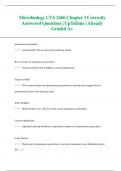
-
Microbiology UTA 2460 Chapter 3 Correctly Answered Questions| UpToDate | Already Graded A+
- Exam (elaborations) • 17 pages • 2024
- Available in package deal
-
- $11.49
- + learn more
spontaneous generation : ancient belief: life can arise from nonliving matter Key scientists of spontaneous generation : Francesco Redi, John Needham, Lazzaro Spallanzani Francesco Redi : This scientist disproved spontaneous generation by showing that maggots do not spontaneously arise from decaying meat. John Needham : Believed there was a life force that caused spontaneous generation Lazzaro Spallanzani : replicated redi and needham's experiments, disproved of spontaneous generatio...
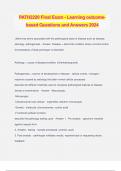
-
PATH2220 Final Exam - Learning outcome- based Questions and Answers 2024
- Exam (elaborations) • 95 pages • 2024
-
- $14.49
- + learn more
PATH2220 Final Exam - Learning outcome- based Questions and Answers 2024 define key terms associated with the pathological basis of disease such as disease, aetiology, pathogenesis - Answer- Disease = abnormal condition where normal function (homeostasis) of body part/organ is disturbed Aetiology = cause of disease/condition (inherited/acquired) Pathogenesis = manner of development of disease - cellular events / changes / reactions caused by aetiology that alter normal cellular processes ...
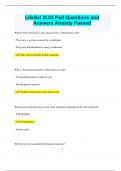
-
LifeSci 2L03 Poll Questions and Answers Already Passed
- Exam (elaborations) • 9 pages • 2024
-
- $9.99
- + learn more
LifeSci 2L03 Poll Questions and Answers Already Passed Which of the following is a key characteristic of prokaryotic cells? - They have a nucleus enclosed by a membrane. - They have mitochondria for energy production. - They lack membrane-bound organelles. What is the primary function of ribosomes in a cell? - Transporting proteins within the cell - Storing genetic material - Synthesizing proteins from amino acids Which macromolecule serves as the main structural component of t...
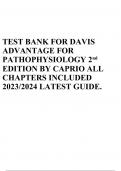
-
TEST BANK FOR DAVIS ADVANTAGE FOR PATHOPHYSIOLOGY 2nd EDITION BY CAPRIO ALL CHAPTERS INCLUDED 2023/2024 LATEST GUIDE.
- Exam (elaborations) • 355 pages • 2023
-
- $20.49
- + learn more
TEST BANK FOR DAVIS ADVANTAGE FOR PATHOPHYSIOLOGY 2nd EDITION BY CAPRIO ALL CHAPTERS INCLUDED 2023/2024 LATEST GUIDE. Chapter 1, The Cell in Health and Illness Multiple Choice Identify the choice that best completes the statement or answers the question. ____ 1. Which statement regarding the sodium–potassium pump is correct? 1. The cell’s plasma membrane is more soluble to sodium ions than potassium ions. 2. The concentration of sodium ions should be higher inside the cell compart...
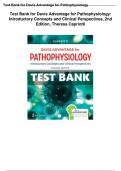
-
Test Bank for Davis Advantage for Pathophysiology: Introductory Concepts and Clinical Perspectives, 2nd Edition, Theresa Capriotti: Chapters 1-23: Updated A+ Guide Solution
- Exam (elaborations) • 355 pages • 2023
-
- $9.50
- + learn more
. Which statement regarding the sodium–potassium pump is correct? 1. The cell’s plasma membrane is more soluble to sodium ions than potassium ions. 2. The concentration of sodium ions should be higher inside the cell compartment. 3. The concentration of potassium ions should be higher outside the cell compartment. 4. The active transport involves pumping out three sodium ions and pumping in two potassium ions. 2. In the absence of oxygen, which cellular function creates the same amo...
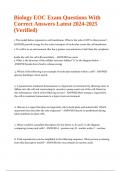
-
Biology EOC Exam Questions With Correct Answers Latest 2024-2025 (Verified)
- Exam (elaborations) • 32 pages • 2024
-
- $13.99
- + learn more
Biology EOC Exam Questions With Correct Answers Latest (Verified) The model below represents a cell membrane. What is the role of ATP in this process? - ANSWER provide energy for the active transport of molecules across the cell membrane 2. If a cell is in an environment that has a greater concentration of salt than the cytoplasm inside the cell, the cell will most likely: - ANSWER lose water 3. What is the function of the cellular structure labeled "A" in the diagram below. - ANSWER bre...
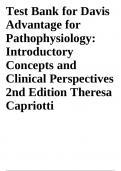
-
Test Bank for Davis Advantage for Pathophysiology: Introductory Concepts and Clinical Perspectives 2nd Edition Theresa Capriotti
- Exam (elaborations) • 355 pages • 2024
-
- $17.99
- + learn more
Chapter 1, The Cell in Health and Illness Multiple Choice Identify the choice that best completes the statement or answers the question. ____ 1. Which statement regarding the sodium–potassium pump is correct? 1. The cell’s plasma membrane is more soluble to sodium ions than potassium ions. 2. The concentration of sodium ions should be higher inside the cell compartment. 3. The concentration of potassium ions should be higher outside the cell compartment. 4. The active transport invol...
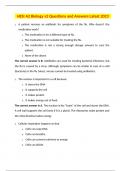
-
HESI A2 Biology v2 Questions and Answers Latest 2023 1. A patient receives an antibiotic for symptoms of the flu. Why doesn’t the medication work? a. The medication is for a different type of flu. b. The medication is not suitable for treating the flu. c
- Exam (elaborations) • 49 pages • 2024
-
- $15.99
- 1x sold
- + learn more
HESI A2 Biology v2 Questions and Answers Latest 2023 1. A patient receives an antibiotic for symptoms of the flu. Why doesn’t the medication work? a. The medication is for a different type of flu. b. The medication is not suitable for treating the flu. c. The medication is not a strong enough dosage amount to cure the patient. d. None of the above The correct answer is B. Antibiotics are used for treating bacterial infections, but the flu is caused by a virus. Although symptoms can be si...
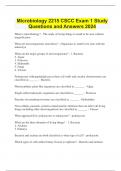
-
Microbiology 2215 CSCC Exam 1 Study Questions and Answers 2024
- Exam (elaborations) • 8 pages • 2024
-
- $11.99
- + learn more
What is microbiology? - The study of living things to small to be seen without magnification What are microorganisms (microbes)? - Organisms to small to be seen with the naked eye What are the major groups of microorganisms? - 1. Bacteria 2. Algae 3. Protozoa 4. Helminths 5. Fungi 6. Viruses Prokaryotes with peptidoglycan in their cell walls and circular chromosomes are classified as ______. - Bacteria Photosynthetic plant-like organisms are classified as ______. - Algae Sing...
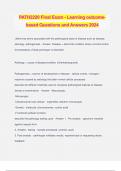
-
PATH2220 Final Exam - Learning outcome- based Questions and Answers 2024
- Exam (elaborations) • 95 pages • 2024
-
- $14.49
- + learn more
PATH2220 Final Exam - Learning outcome- based Questions and Answers 2024 define key terms associated with the pathological basis of disease such as disease, aetiology, pathogenesis - Answer- Disease = abnormal condition where normal function (homeostasis) of body part/organ is disturbed Aetiology = cause of disease/condition (inherited/acquired) Pathogenesis = manner of development of disease - cellular events / changes / reactions caused by aetiology that alter normal cellular processes ...

$6.50 for your textbook summary multiplied by 100 fellow students... Do the math: that's a lot of money! Don't be a thief of your own wallet and start uploading yours now. Discover all about earning on Stuvia


